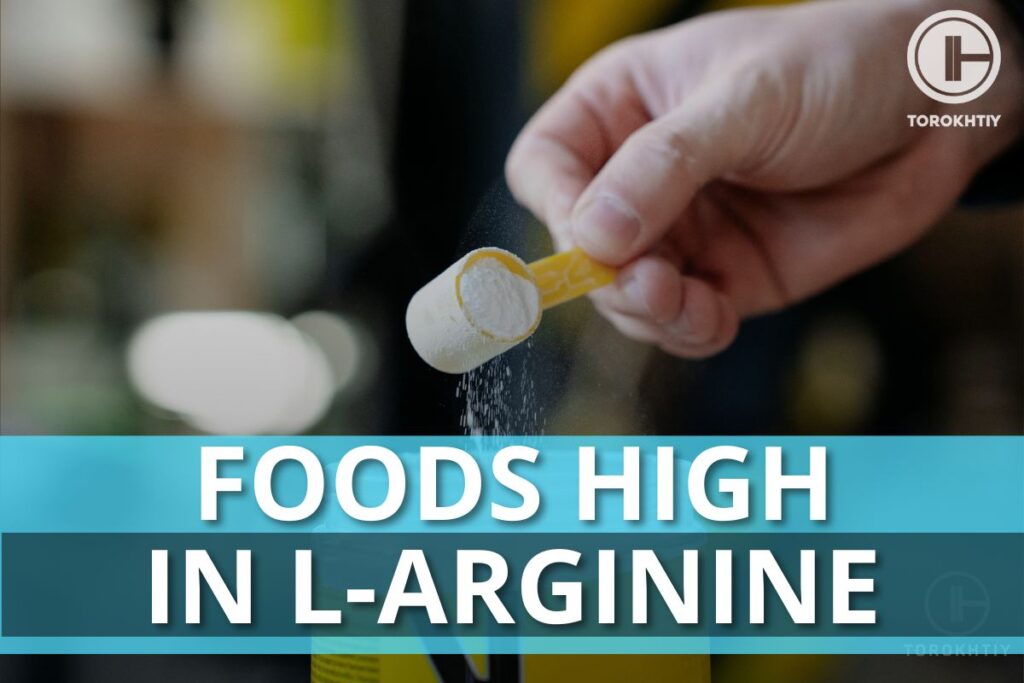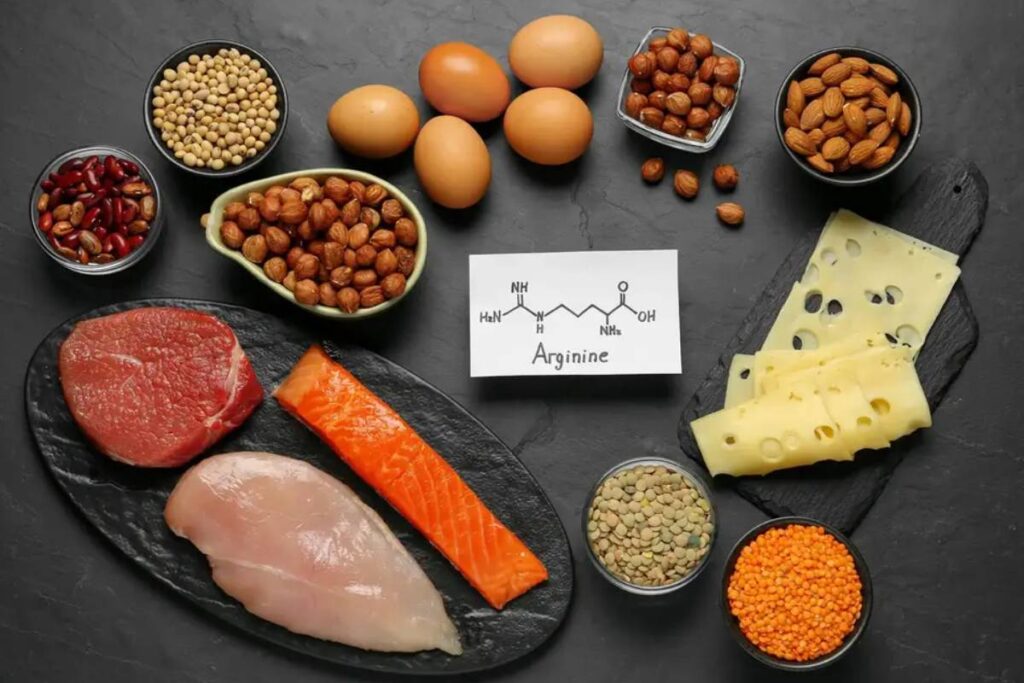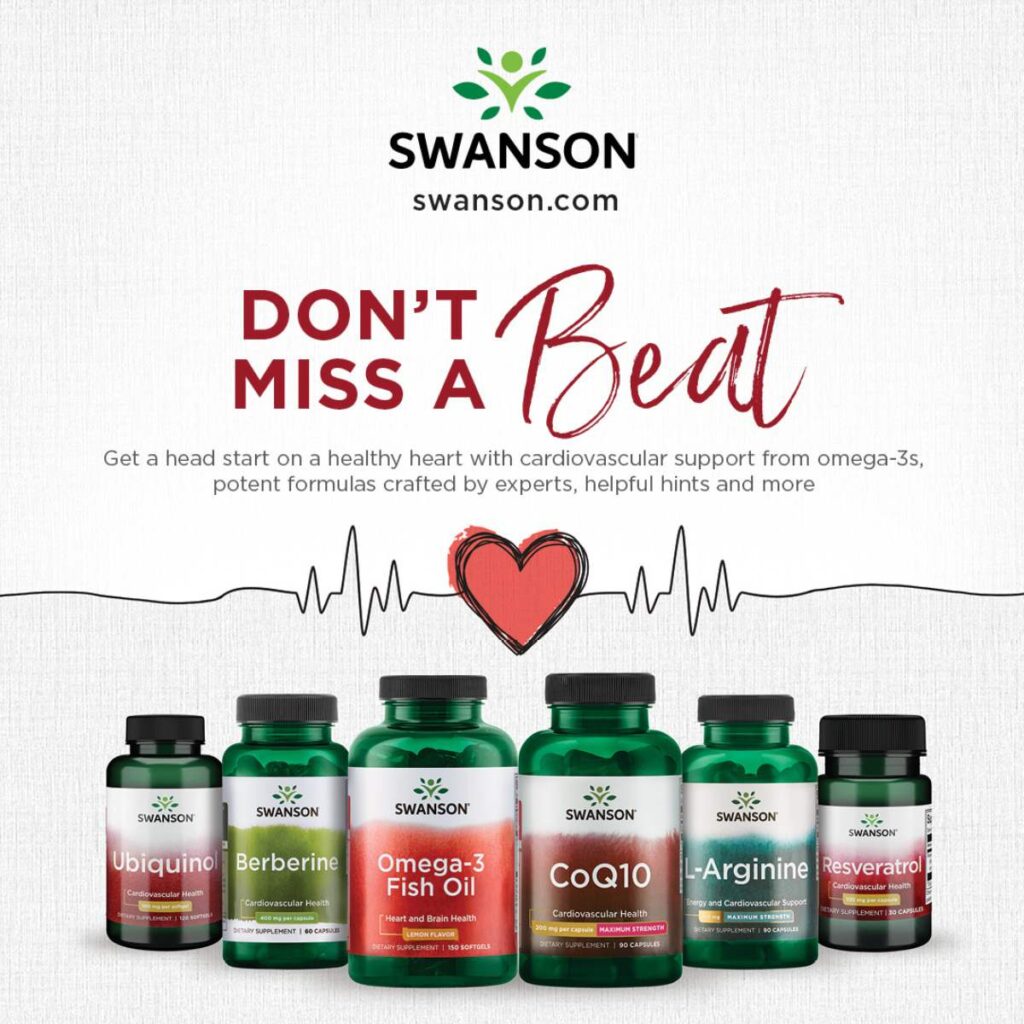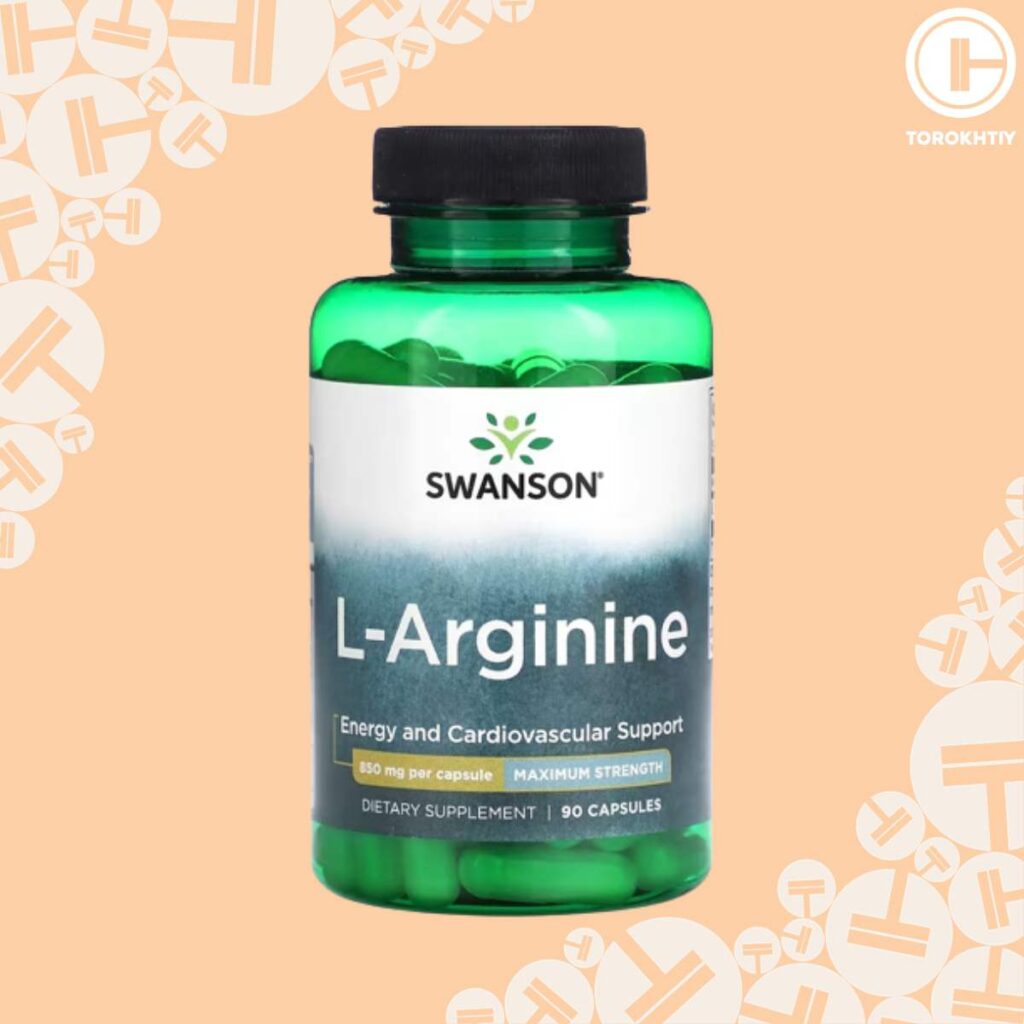Best High-Arginine Foods Nutritionists Recommend
If you’re looking to maximize arginine in the diet, then you may be interested in this list of foods high in arginine.
While many people eating a protein-rich diet likely already get enough arginine in their diet, increased arginine intake may be related to certain health benefits.
If you want to increase arginine intake without altering your diet, you may be more interested in supplementing with arginine.
Animal-based foods high in arginine include seafood and meat. Plant-based foodsthat contain arginine include nuts, seeds, and meats. While arginine is a non-essential amino acid, it appears that arginine intake is an area of concern for many people, with 25% of people having suboptimal daily intake.

What Is Arginine and What Are Its Functions?
Arginine is a non-essential amino acid, meaning it is produced by our body and does not need to be consumed in the diet. With that being said, it appears additional arginine intake provides benefits for many bodily functions including reproductive, cardiovascular, and pulmonary functions, just to name a few.
Arginine is perhaps most well known for being a precursor to Nitric Oxide, which dilates blood vessels, a process known as vasodilation. While many people supplement with arginine to achieve this effect, supplementation with arginine does not appear to increase vasodilation in sufficient amounts to improve performance.
While it’s technically a non-essential amino acid, it appears the body can put additional dietary arginine to good use. A large portion of the population does not get enough arginine through the diet to promote optimal health.
It appears that ~25% of the population does not consume sufficient arginine, which may have implications for health conditions such as cardiovascular disease. Note that low arginine intake is defined as anything less than 2.6g/day, while the mean arginine intake of adult populations is 4.4g/day.
If you are taking in a low amount of arginine every day, trying to get more arginine in through the diet may be a good idea for promoting overall health.
What Are the Foods Highest in L-Arginine?
As mentioned, many people eat a low amount of L-Arginine every day, but this doesn’t necessarily mean it’s difficult to get through your diet either! As we’ll cover below, there are plenty of animal-based and plant-based sources of arginine readily available.
L-Arginine appears to be found in most protein-rich foods. Below we’ve used data from the USDA to show how much arginine is in certain foods. Because there are varying amounts of arginine across different proteins, we recommend incorporating many different protein-rich foods in your diet to ensure you’re getting adequate arginine intake.

1. The Best Animal-Based Food Sources of Arginine
If you’re looking to increase arginine intake, virtually all meats are arginine-rich foods. You should get significant amounts of arginine from turkey, chicken, beef, pork, and fish. Below we’ve provided a table
| Type of Meat | Protein per 100g | Arginine per 100g |
| Turkey (Raw) | 19.5g | 1.37g |
| Chicken (Raw) | 22.5g | 1.52g |
| Beef (Raw) | 17.2g | 1.12g |
| Pork (Raw) | 16.9g | 1.05g |
| Salmon (Raw) | 19.8g | 1.19g |
Overall, any animal-based sources of protein should provide at least a moderate amount of arginine. While eggs and milk appear to have some arginine as well, meat is likely the best animal-based source of this amino acid.
2. The Best Plant-Based Sources of Arginine
If you’re vegan or vegetarian, you can still get significant amounts of arginine in through high-arginine foods like nuts, seeds, and plant-based protein powders.
Similar to animal-based products, any plant-based foods rich in protein should be good sources of arginine. Below we’ll be using the USDA’s information to cover nuts, seeds, and legumes that are great sources of arginine.
| Type of Plant Food | Protein per 100g | Arginine per 100g |
| Pumpkin Seeds | 30.2g | 5.35g |
| Sunflower Seeds | 20.8g | 2.4g |
| Almonds | 21.2g | 2.46g |
| Pine Nuts | 13.7g | 2.41g |
| Soybeans | 36.5g | 3.15g |
| Chickpeas | 8.86g | 0.835 |
| Peanuts | 25.8g | 3.08g |
It’s also worth noting that soy protein isolate appears to contain about 4.8g of arginine per 100g. Meanwhile, whey has a significantly lower amount of 1.7g of arginine per 100g.
This implies a high-quality plant-based protein powder may be one of the most efficient ways to get arginine in through the diet, while dairy-based protein powders are a much less potent source.
Note that we covered these foods specifically because they’re some of the best sources of vegan protein. Keep in mind that most foods with arginine are simply high in protein, arginine content is just dependent on how much protein the food contains.
Similar to animal-based sources of protein, most plant-based protein sources should contain at least some arginine. This is why we recommend eating a protein-rich diet diverse in different foods.
What Are the Benefits of Supplemental Arginine?
While we recommend trying to get most of the arginine in your diet through protein-rich foods, it may be more convenient for you to choose an arginine supplement instead.
Especially with it being difficult to know exactly how much arginine is in each source of protein, supplementation can be a convenient way to ensure you’re getting enough through your diet. Below we’ll be covering some of the potential benefits of this supplement.

✅ Does L-Arginine Supplementation Increase Blood Flow?
While L-Argnine is commonly marketed in fitness supplements as a vasodilator, research suggests supplementation will likely not increase this effect. L-Arginine is commonly marketed as a performance booster due to its role as a precursor to NO in the bloodstream.
However, supplemental arginine does not appear to affect blood flow sufficiently to improve exercise performance.
This has been demonstrated in studies which have shown that L-Arginine supplementation does not lead to significant changes in performance. Although arginine is used in the body to stimulate vasodilation, it’s unlikely that supplementation will affect this much.
✅ L-Arginine Supplementation for General Health
As mentioned above, Arginine is used in the body as more than just a precursor for Nitric Oxide. So, does supplementation have any benefits for your general health? It appears that increased arginine intake, whether through diet or supplementation, has benefits for many functions throughout the body.
It appears that arginine may not only be beneficial for certain medical conditions, but may benefit reproductive health, and immune function. While arginine does not appear to be useful as a performance supplement, this makes a compelling case for the use of arginine as a dietary supplement.
L-Arginine may even be beneficial for cancer patients going through radiation treatment. While further research is needed to fully support these claims, preliminary research shows that it may be beneficial. It appears this is because of arginine’s effects on tumor cells, as well as the ability to boost the activity of antitumor immune cells.
We recommend consulting with your doctor about the potential benefits of arginine supplementation. Overall, if you’re getting enough arginine through your diet already, there’s little reason to suggest that added supplementation will make much of a difference in terms of performance, although it may be beneficial for overall health.
Arginine Supplement We Recommend
If you’ve decided that an L-Arginine supplement is right for you, we recommend trying Swanson’s L-Arginine capsules. It’s worth noting that Arginine is included in many pre-workout and “nitric oxide boosting” supplements as well.
However, taking Arginine on its own may be ideal for overall health purposes. Each serving of Swanson’s L-Arginine is a single capsule containing 850mg. Depending on your estimated daily intake of arginine, you may want to take several servings of this supplement to maximize its effectiveness.
As mentioned, low arginine intake is defined as anything less than 2.6g/day. This means 2-3 servings would be necessary to reach a more average daily intake of arginine of 4.4g/day.
It’s worth noting that this is not a vegan-friendly product as its capsules are made with gelatin. This is not ideal, as it’s likely that vegans eating a low-protein diet would benefit the most from additional arginine supplementation.

It’s also worth noting that Swanson’s product does not have any third-party certifications assuring quality or good manufacturing practices. While this doesn’t mean it isn’t a high-quality product, these certifications are a good way to make sure a product is made with quality ingredients and doesn’t contain any potential contaminants.
Finally, the most attractive part of Swasnon’s L-Arginine is undeniably the price. Each 850mg capsule will only cost you about $0.06. This makes it an excellent affordable choice if you’re looking to try L-Arginine supplementation for the first time.
It’s worth noting that if you were looking to supplement with L-Arginine for performance, you may be better off using a high-quality pre-workout supplement instead.
That’s because the combination of caffeine and active ingredients will provide a much more meaningful difference to your performance when compared to L-Arginine.
FAQ
What Food Has the Highest L-Arginine?
Most protein-rich foods contain some L-Arginine in varying amounts. According to the USDA, the food highest in L-Arginine per 100g will be pumpkin seeds at 5.35g per serving.
However, keep in mind that all meat, nuts, and seeds will be solid sources of arginine. Overall, eating a diverse diet of protein-rich foods will be the best way to ensure a high daily intake of arginine.
Are Eggs High in L-Arginine?
According to the USDA, 100g of eggs contain ~0.82g of arginine. While this is a decent source of arginine, most meat and nuts have significantly higher total arginine content.
With that being said, like any high-protein food they can be useful for boosting your total arginine content.
Which Fruit Has the Most L-Arginine?
There aren’t many fruits high in arginine because most fruits don’t have significant protein content. You’re more likely to find vegetables high in arginine, as vegetables typically have slightly higher protein content than fruit.
It’s worth noting that fruit seeds may be an excellent source of arginine, with watermelon seeds being a great example!
Are There Any L-Arginine Foods to Avoid?
There aren’t any specific l-arginine foods to avoid as long as you don’t have any aversions or you’re not allergic. While there may be some concerns with getting excessively high l-arginine intake, this is likely impossible to do through diet alone.
Conclusion
While it’s often difficult to say exactly how much arginine is in a certain food, most protein-rich foods will contain a decent amount of arginine in each serving. Keep in mind that our bodies produce arginine naturally, meaning arginine is not exactly a nutrient of concern for most.
However, additional arginine does appear to be beneficial for various bodily functions. With many people not getting much arginine in through their diet, adding more arginine may still be a good idea!
While you should be able to get more than enough L-Arginine through diet alone, if you’re looking for a high-quality arginine supplement, we recommend using Swanson L-Arginine.
Do you struggle to get enough protein in your diet? Have you ever tried any arginine supplements? Let us know your thoughts in the comments below!
Also read:
- L-Citrulline vs L-Arginine
- L-Citrulline Foods
- Foods With Glutamine
- L Carnitine vs Cla
- Acetyl L Carnitine or L Carnitine Tartrate
- Is L Carnitine a Fat Burner
- Best L-Citrulline Supplement
- L Arginine Weight Loss
- L-Citrulline Dosage for Pump
References
- Guoyao Wu, et. al, “Arginine metabolism and nutrition in growth, health and disease,” Amino Acids. 2009 May; 37(1): 153–168
- U.S. Department of Agriculture, “FoodData Central, ” usda.gov, https://fdc.nal.usda.gov/index.html (accessed October 17, 2023)
- Stefan H.M. Gorissen, et. al, “Protein content and amino acid composition of commercially available plant-based protein isolates,” Amino Acids. 2018; 50(12): 1685–1695
- Bobby J. White, et. al, “Effect of Two Week L-Arginine Supplementation on Variables Related to Endurance and Strength Performance in Collegiate Football Players,” International Journal of Exercise Science: Conference Proceedings: Vol. 2: Iss. 8, Article 96. (2016)
- Dr. Leandro Cerchietti, Dr. Rossella Marullo, “Arginine, an Inexpensive Oral Drug, Could Enhance Radiation Therapy for Cancer,” Weill Cornell Medicine, https://news.weill.cornell.edu/news/2021/11/arginine-an-inexpensive-oral-drug-could-enhance-radiation-therapy-for-cancer (accessed October 17, 2023)
Why Trust Us?
With over 20 years in Olympic Weightlifting, our team does its best to provide the audience with ultimate support and meet the needs and requirements of advanced athletes and professional lifters, as well as people who strive to open new opportunities and develop their physical capabilities with us.
By trusting the recommendations of our certified experts in coaching, nutrition, dietology, and sports training programming, as well as scientific consultants, and physiotherapists, we provide you with thorough, well-considered, and scientifically proven content. All the information given in the articles concerning workout programming, separate exercises, and athletic performance, in general, is based on verified data. We ensure that you can rely on our professionals’ pieces of advice and recommendations that can be treated as personalized ones which will benefit you and fully meet your needs.
The product testing process is described in more detail here
Author: David Sasha Schulz
Doctor of Chiropractic, BSc Human Biology, CSCS
Strength coach (CSCS) – 10 years
Sasha is a Chiropractor and Kinesiologist practicing in Kelowna, BC, Canada. He has been practicing Chiropractic since 2019, integrating manual therapy, strength training and programming principles, and nutritional strategies to get his patients optimal results. He currently scratches the competitive itch in fitness, and the occasional endurance race, and plays golf and snowboards for fun. He has an interest in all strength and fitness-related sports.








